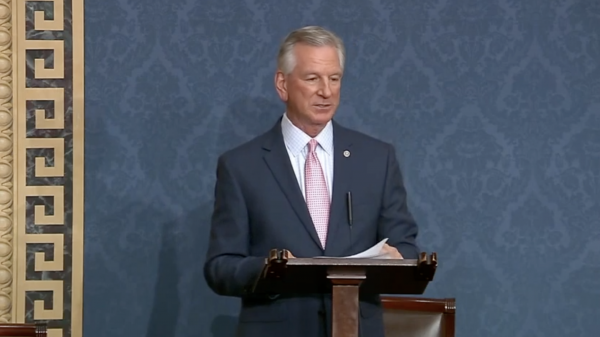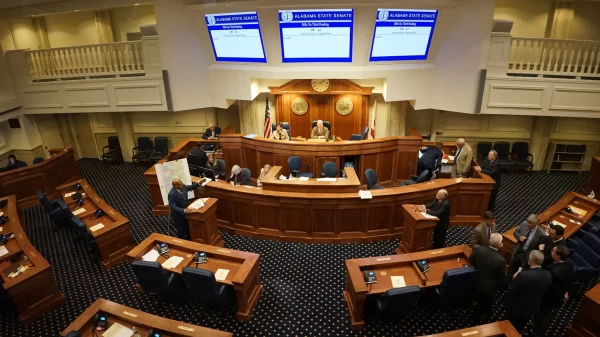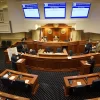A bill to create a school voucher program in Alabama received its first public hearing in a committee of the Alabama Senate Wednesday with speakers sharply divided on the merits of the bill.
The Parental Rights in Children’s Education (PRICE) Act would create Educational Savings Accounts in the state, which would allow Alabama students to go to a private school of their parents’ choosing or homeschooling and pull funds from the Education Trust Fund to subsidize their tuition.
The speakers were evenly split between proponents and opponents Wednesday, although the room was filled with proponents who clapped after every speaker in favor of the bill and sat silent following the opposition.
Proponents say that the bill gives parents the rights to put their children in the best possible educational environment and more fairly distributes education funds.
Opponents said the bill lacks the accountability that should be tied to public monies.
The bill would phase the ESAs in over a period of three school years, adding one-third of the student population each year.
A fiscal note attached to the bill said this will cost the ETF a minimum of $288 million in 2025 and at least $571 million in 2026.
And those numbers may even be a conservative estimate, as proponents said those numbers are based on a current private school population of about 65,000, but a private school official speaking in favor of the bill estimated about 87,000 private school students in the state. The estimates also figure in a 5 percent adoption by current public school students.
“It’s time to fund students, and not systems,” said Becky Gerritson, executive director of the Eagle Forum of Alabama. “Dollars should go to educating students, and not propping up institutions.”
Gerrtison emphasized that the program would benefit families who already enroll their students in private education rather than students currently in struggling Alabama schools. The fiscal note estimates are based on 5 percent take-up; Gerritson told the committee about 1 to 3 percent of public students leave public schools when voucher programs are enacted.
According to Gerritson, that “fraction of competition” makes public schools perform better, not worse.
Allison King, government relations director for the Alabama Education Association, said the problem with the bill is accountability and oversight.
“There is none,” King said. “All public schools currently have accountability requirements for their funds, achievement and more. But there is no requirement for that with this bill.”
King drew committee members’ attention to lines that establish an online payment portal and a line that allows for prepayment of expenses.
“It’s an ideal setup for fraud,” King said. “Speaking of fraud, under the PRICE ACT, a little bit of fraud is fine. It only becomes actionable if the fraud is ‘sustainable’ or ‘substantial.'”
Sen. Larry Stutts, R-Sheffield, said that fraud exists everywhere, including in public education.
Proponents of the bill said the online payment portal is actually more robust for auditing funds than public education, as improper purchases can be found in real-time and those accounts can be suspended.
King also pointed out lines that allow parents to buy iPads, send their kids to Space Camp and even fund travel ball expenses. And the bill could also allow “double dipping,” King said, with parents possibly getting an ESA in addition to the school choice already available under the Alabama Accountability Act.
Terry Lathan provided a statement from ALGOP chairman John Wahl to the committee describing the Alabama Republican Party’s support of the bill.
“We believe the child’s quality of education should not be decided but heir zip code and that education funding should follow the student,” Wahl said in the statement. “We trust that parents know the needs of their children better than any government.”
Robin Mears, executive director of the Alabama Christian Education Association, said ESAs create a fair system for parents and improve education by empowering the parent.
“When you improve and empower the parent, you get to the very basis of improving education,” Mears said. “When parents are restricted in their choice, and have to pay twice—once to pay for their taxes and once to pay for their nonpublic education—it limits what we all can do.”
Ryan Hollingsworth, executive director of the School Superintendents of Alabama, said the average Alabama household would be paying in about $2,700 a year in income taxes, but would be receiving up to $14,000 to put two children through school.
“Well, that’s not just their money, it’s other public monies,” Hollingsworth said.
He also challenged the committee to look at test scores at schools under the AAA Act in Alabama, noting that children in those schools are largely not performing at the level of public school students.
Following the public hearing, Senate Education Policy committee chair Donnie Chesteen, R-Dothan, announced that the bill needs to go before the finance and taxation education committee because it deals with appropriating education funds.
Stutts said he “knows the stalling tactics.”
“I asked for this bill to start in the budget committee,” Stutts said.
The political move could hold the bill up for weeks as the public would be entitled to another public hearing when the bill comes up in the new committee, and committee chairs often hold off on voting on bills with public hearing until the following week. Even if the bill makes it out of the budget committee, Chesteen said it would need to return to the policy committee for approval as well. Only five legislative weeks remain in the session.
Despite the move, Stutts said he will continue to push the bill for the remainder of the session. Rep. Ernie Yarbrough, R-Trinity is carrying the House version of the bill, which has yet to come before a committee.






















































